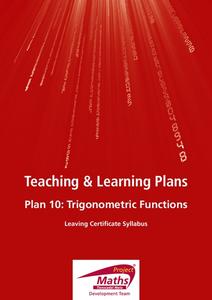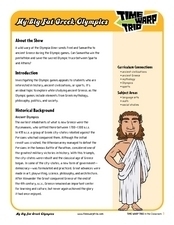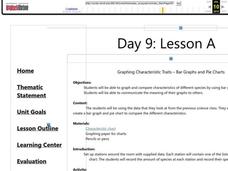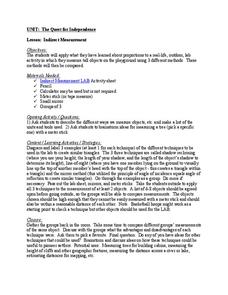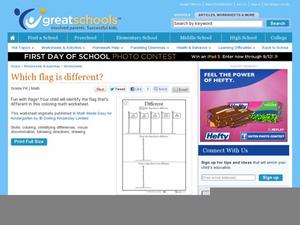Project Maths
Trigonometric Functions
From a circle to a cycle! The final instructional activity of a five-part series challenges learners to use points from the unit circle to plot a repeating pattern. The repeating patterns become the graphs of the trigonometric functions....
Concord Consortium
Square-Ness
Are there some rectangles that are more square than others? A thought-provoking task asks individuals to create a formula that objectifies the square-ness of a set of rectangles. They then use their formulas to rank a set of rectangles.
Time Warp Trio
My Big Fat Greek Olympics
The Olympic Games are indeed a significant and far-reaching cultural component in our international community today, but from where do they originate? Where do our traditions stem from, and how do we choose the sports that constitute...
Curated OER
Teaching Reading Comprehension through Social Studies Readings
Examine how immigrants have changed the environment of the United States. Individually, middle schoolers will take a pre- and post-test to assess their reading comprehension. In groups, they compare and contrast the religions of...
Curated OER
Bar Graphs and Pie Charts
Students graph data they collected and analyze it using a bar graph. In this algebra activity, students analyze their data using pie charts and bar graphs while explaining the meaning to each other. They compare and contrast bar...
Curated OER
Indirect Measurement
Learners measure and apply their knowledge of proportion to solve problems. In this geometry lesson, students measure using a meter stick, small mirror and measuring tape. They compare and contrast their measurements to objects outside...
Curated OER
Exponential Functions and the Natural Logarithm
Young scholars solve exponential and log functions. In this algebra instructional activity, students graph natural log and logarithmic functions. They compare and contrast between logs and the exponential graphs.
Curated OER
Get On Board
Students create a ticket table illustrating the cost of tickets by alternative transportation. In this number sense lesson, students write number sentences to compare and contrast difference information in their chart. Students figure...
Curated OER
1930 Census and the Consitution
Students read the Constitution and discuss the importance of enumeration. In this Census instructional activity, students complete a Census schedule and discuss the job skills of applicants. Students research Census data to compare and...
Curated OER
Area Unit
Students solve the area for parallelograms,squares, rectangles, trapezoids, and triangles. In this geometry lesson, students compare and contrast two dimensional shapes and apply their properties to solving real life scenarios. This is a...
Pennsylvania Department of Education
Use Order of Operations to Evaluate Expressions—No Grouping Symbols
Students identify and explain different types of data collection and graphs. For this graphs and data collection lesson, students record their observations of a variety of data collection tools and graphs displayed in the room. Students...
Curated OER
The Spider Beside Her
Second graders are introduced to the characteristics of spiders. In groups, they compare and contrast spiders to different insects to discover spiders are not an insect at all. In groups, they create a model of a spider and discuss its...
Curated OER
Venn Diagram- Two Circles
In this algebra instructional activity, students use Venn Diagrams to compare and contrast their data given special equations. There are 4 questions with an answer key.
Curated OER
Teddy Bears Everywhere
Learners explore the history of teddy bears. In this comprehension lesson, students bring a bear of their own to compare and contrast with their classmates. Learners read book and discuss the events and draw pictures of the scenes.
Curated OER
Fraction Circles
Fourth graders receive a fraction circle and show how each different part makes a whole. Students compare the different fractions that make up a whole. Students choose 2 fractions which are inside a bucket and they compare them both...
Curated OER
Roping Quadrilaterals
Learners explore with quadrilaterals. In this roping quadrilaterals lesson, students work in cooperative groups to play the game, "Question, please!" in order to identify, describe, compare and classify quadrilaterals. Learners also...
Curated OER
Double Vision - Comparing Curious George Pictures
In this comparison instructional activity, students look at 2 Curious George pictures and attempt to find the 12 things that are not the same in the pictures. They see pictures of circus trains and animals.
Curated OER
Word Problem Exchange
Learners discuss elements of word problems: key words, data, computation clues, and unnecessary information and use the four steps of problem solving to find a solution and check for reasonableness.
Dorling Kindersley
Which flag is different?
Little ones build visual discrimination skills and fine motor control, while identifying differences. They circle the flag that is different, then they draw a flag that looks different than the others and the same as the others shown....
Curated OER
Fraction and Decimal Ordering
Ordering numbers just got physical! Learners practice putting numbers in sequence, both in fraction and decimal form. To begin, they line up in birthday order and discuss the difference between ascending and descending. They are then...
Curated OER
Ordering Rational Numbers and Finding Their Approximate
Middle schoolers explore the concept of ordering rational numbers on a number line. They represent rational numbers as decimals and percents. Pupils create a foldable about converting fractions to decimals to percents, and use a...
Lycoming College
An Author Study of Jan Brett
Jan Brett, the author of many beloved children's books, is well worth a study. Try out this winter-themed unit, which covers areas of language arts as well as art, math, science, and social studies.
Curated OER
Compare and Order Numbers
In this compare and order numbers worksheet, 6th graders solve 15 different problems that include comparing and ordering various numbers. They write either greater than or less than to indicate which is greatest in each set of numbers.
Think Like A Programmer! Puzzlets Cork the Volcano Curriculum
Common Core Standards Connected
The standards listed below are standards from the Common Core Framework which map to learning opportunities with Cork The Volcano & Puzzlets.
Source Link: http://www.corestandards.org/
Grade...


